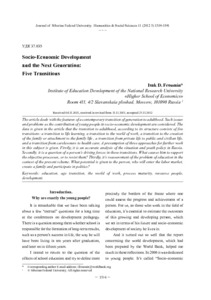Социально-экономическое развитие и следующее поколение: пять переходов
Скачать файл:
URI (для ссылок/цитирований):
https://elib.sfu-kras.ru/handle/2311/3115Автор:
Фрумин, И.Д.
Froumin, Isak D.
Дата:
2012-12Аннотация:
The article deals with the features of a contemporary transition of generation to adulthood. Such issues
and problems as the contribution of young people in socio-economic development are considered. The
data is given in the article that the transition to adulthood, according to its structure consists of five
transitions: a transition to life learning, a transition to the world of work, a transition to the creation
of the family or attachment to the family life , a transition from private life to public and civilian life,
and a transition from carelessness to health care. A presumption of three approaches for further work
in this subject is given. Firstly, it is an accurate analysis of the situation and youth policy in Russia.
Secondly, it is a question of a persons driving forces in these transitions. What causes him to support
the objective processes, or to resist them? Thirdly, its reassessment of the problem of education in the
context of the present scheme. What potential is given to the person, who will enter the labor market,
create a family and participate in politics? Обсуждаются особенности современного поколенческого перехода к взрослости. Исследуются
вопросы вклада молодого поколения в социально-экономическое развитие. Приводятся
данные о том, что переход к взрослости по своей структуре состоит из пяти переходов:
переход к учению в течение всей жизни; переход в мир труда, работы; переход к созданию
семьи или к семейности; от частной жизни к жизни общественной и гражданской; переход
от беззаботности к заботе о здоровье. Выдвигается предположение, о трех направлениях
дальнейшей работы в этой тематике. Во-первых, это точный анализ ситуации и молодежной
политики в России. Во-вторых, вопрос о том, каковы собственные движущие силы
человека в этих переходах. Что заставляет его поддерживать объективные процессы или
сопротивляться им. В-третьих, переоценка задачи образования в контексте представленной
схемы. Какой потенциал дается человеку, который выйдет на рынок труда, начнет создавать
семью и участвовать в политике.

